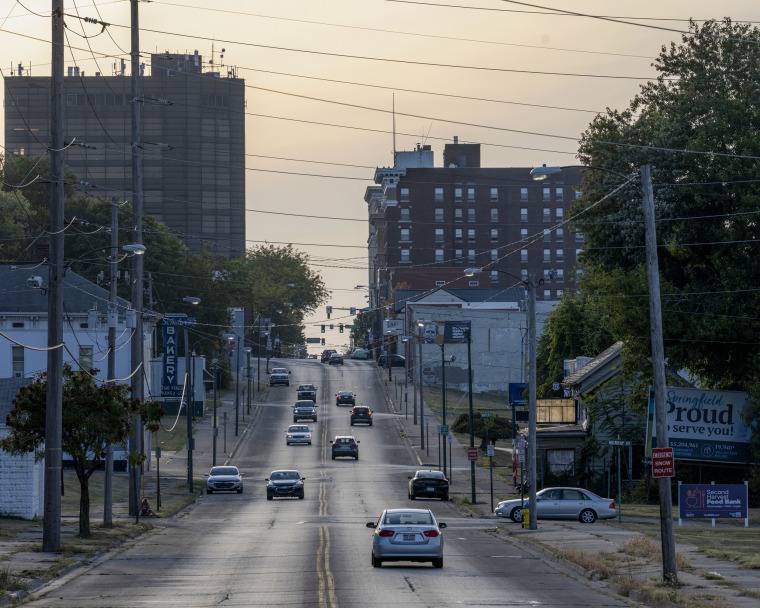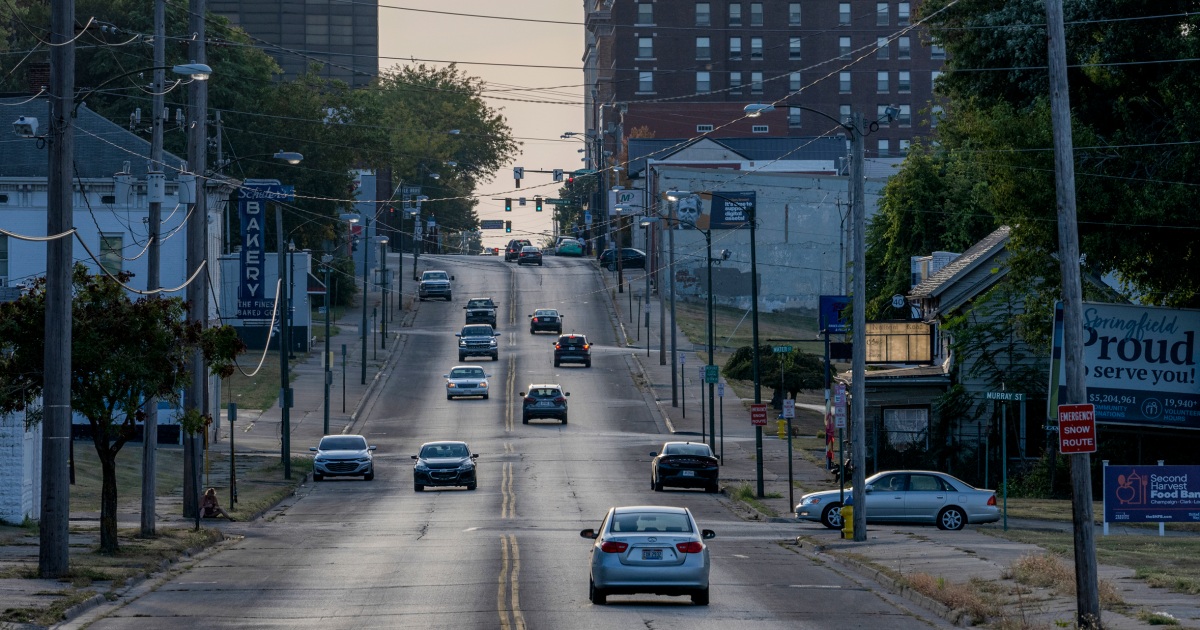Camera Bartolotta knew she had to say something.
The Republican state senator in Pennsylvania caught wind that former President Donald Trump was targeting a small town in her district as part of his new focus on recent Haitian immigration to red America.
At a rally earlier this month, Trump mentioned that Charleroi, with a population of 4,000 people, had experienced a significant wave “of Haitian migrants under Vice President Kamala Harris” that was “costing local taxpayers hundreds of thousands of dollars.” He claimed the town was now “virtually bankrupt” as immigrants brought “massive crime to the town and every place near it.”
Soon after, right-wing influencers began parachuting in, hoping to document evidence of immigrant malfeasance and uncover divisions in the town. Rumors of migrant workers being “bused in” quickly spread online.
So Bartolotta took to social media. On Facebook, she said the recent immigrants to her community were there “LEGALLY to WORK, and pay taxes, and raise their children, and be part of the community, etc.” On X, she pushed back against videos claiming to show migrants being bused in, imploring the right-wing Libs of TikTok account to “Please, check the facts before posting information [that] jeopardizes the safety of good, hard-working people.”
In an interview with NBC News, Bartolotta said she couldn’t let these comments go unchecked.
“I know the story of my neighborhood town, and I know the plight that a lot of these people escaped. I know what the kids are going through,” she said. “To see how the issue was being twisted and these individuals were being maligned and threatened and completely misunderstood, I felt it necessary [to speak out], because I represent everyone in my district, even those people who are there on work visas and are doing their best to raise their families.”
“I wanted to clear the air,” she continued. “I think I just poured gasoline on a fire. Who knows? But I just wanted to set the record straight.”
Bartolotta isn’t alone among Republicans fighting these narratives. About 230 miles west of Charleroi along Interstate 70, Rob Rue, the mayor of Springfield, Ohio, and Melanie Flax Wilt, the president of the Clark County Commission, have forcefully pushed back on debunked rumors Trump and his running mate, Sen. JD Vance, R-Ohio, have spread about Haitian immigrants eating residents’ pets.
Though these local Republicans haven’t named Trump and Vance as directly responsible, they’ve sought to counter the idea the men at the top of their party’s ticket have spread that Springfield is being overrun and torn apart by the new arrivals. They’ve pushed for the rhetoric to be toned down as the city deals with a series of bomb threat hoaxes at local schools.
The episode has become a flashpoint in an election where immigration is a top issue. Trump has railed against the recent wave of immigration to those towns during the presidential debate, at rallies and online, while Vance has focused more on Springfield.
The pushback from local officials is reminiscent of the aftermath of the 2020 election, when Republican election administrators in Arizona, Georgia and Pennsylvania had to combat Trump’s stolen election falsehoods.
Meanwhile, Republican officials in red-America municipalities now find themselves in a similar spot to Democratic officials in big cities, who for years have hit back when Trump has sought to nationalize issues in their locales.
Another layer to this fight hearkens back to Trump’s first run in 2016. A touchstone of the former president’s campaigns has been to revitalize towns like Springfield and Charleroi that were being left behind and have spent decades watching their population dwindle and jobs leave.
The new waves of immigration to those towns have been instrumental in reversing some of those trends — and local GOP officials have been sure to point to that fact when defending the new arrivals.
“We’ve seen 8,500 jobs come here over the last 10 years,” Rue told NBC News in an interview. “We’re seeing houses come online over the next five years, about 2,000 houses. Those are things to brag on for a city like ours and those are things we need to be talking about.”
‘Maybe you should switch parties’
The political backdrop for Charleroi and Springfield couldn’t be more similar. Trump won Washington County, Pennsylvania, home to Charleroi, by 22 points in 2020. In Clark County, Ohio, he won by 23 points that year. Charleroi is about one hour from Pittsburgh. Springfield is about one hour from Columbus and about 40 minutes from Dayton.
In Charleroi, estimates are that anywhere from a few hundred to 2,000 Haitian immigrants have settled there in recent years (immigrants from other nations have also settled in the area over the past decade).
In Springfield — which, with a population of nearly 60,000, is significantly larger than Charleroi — that number is about 12,000 to 15,000, many of whom have been able to come to America under a federal humanitarian program for migrants. Others have tourist visas and green cards, though Vance recently said at a rally that he still viewed them as “illegal” because he did not believe in the legitimacy of the programs by which they arrived.

Local officials in both Charleroi and Springfield have highlighted problems that have arisen because of the wave of immigration — concerns over dangerous driving, a need to hire interpreters at local schools, difficulties due to a language barrier and strains on local resources. But they, as well as local business leaders, have made clear the new immigrants are contributing positively to the local economy, growing the tax base and not adding to an increase in crime, contrary to what the GOP presidential ticket has said.
“You may never see me again, but that’s OK,” Trump said at a rally last week announcing he would make a campaign stop in Springfield. “‘Whatever happened to Trump?’ ‘Well, he never got out of Springfield.’”
Rue and Flax Wilt have not said whether they will support Trump in the fall. In his interview with NBC News, Rue made a point of saying that while he is a registered Republican, he was elected to a nonpartisan role and is not “necessarily involved in party political conversations a lot.” While he has received support from constituents for how he’s handled the episode, Rue said he’s also heard concern “because I am a Republican.”
Laura Rosenberger, the executive chairman of the Clark County Republican Party, said Rue has not been involved in boosting the local party even though he does vote Republican. She expressed serious concerns that both Rue and Flax Wilt would not come out publicly and support the party’s standard bearer. She added Trump should visit somewhere other than Springfield when making a trip to Clark County.
“If you’re a Republican and you’re publicly admitting to the media that you can’t make up your mind whether or not you’re going to vote for President Donald Trump, well, then maybe you should switch parties,” she said. “It sends a message of divisiveness, and that is not good for the Republican brand. They need to get on board with being a Trump supporter on this.”
The GOP pushback went a few rungs higher on Friday, when Ohio Gov. Mike DeWine, a Republican born in Springfield, authored a New York Times op-ed seeking to counter the Trump and Vance narrative about the town. He said “as a supporter” of the ticket, he was “saddened by how they and others continue to repeat claims that lack evidence and disparage the legal migrants living in Springfield.”
“This rhetoric hurts the city and its people, and it hurts those who have spent their lives there,” he wrote. (Vance said at a Saturday event that “DeWine has endorsed the Trump-Vance ticket, and we are a big-tent party, and we’re going to have people who have disagreements and that’s OK.”)
‘It’s really hard to discern what the truth is unless you’re here’
Back in Charleroi, Bartolotta is public about her support for the former president and said she doesn’t blame him for the national scrutiny the town is facing. After the attempt on his life in nearby Butler, Pennsylvania, at a July rally, Bartolotta changed her profile picture on X to the iconic shot of Trump raising his fist.
She plans to meet with Trump on Monday during a visit to western Pennsylvania, where she said she “will be happy to share with him [to] please, please come to Charleroi so we can show you these wonderful people, because it’s a different story everywhere.”
“Tensions are high everywhere, and some people are reading all sorts of things coming at them from every different angle,” she said. “It’s really hard to discern what the truth is unless you’re here. So I just am hoping that people take a pause and, you know, dial down the vitriol.”
Bartolotta emphasized that the immigrants in Charleroi had not entered the country illegally through the border with Mexico, adding that many came to the town because of the efforts of a major factory owner who had long struggled to find employees for a facility he was hoping to keep open locally. At the moment, the town is rallying in hopes of preventing a separate factory from leaving town after it recently announced its closure.
“Let me be very clear: Nobody in Washington County is saying anything negative about the Haitians,” said Sean Logue, chairman of the Washington County GOP. “We do not have a negative opinion of them at all. They actually have a good reputation as far as being churchgoing and being hardworking.”
But he said the immigration has outpaced what the town can keep up with and laid blame at state and federal Democratic leaders for not providing additional resources and bolstering budgets. Logue expects Trump to soon make a visit to the town. Brian Hughes, a senior Trump adviser, declined to say whether such a visit was in the works.
Asked about Bartolotta’s advocacy, Logue said locals “think she’s a tremendous asset” who “represents our constituents well.”
Joe Manning, Charleroi’s borough manager, who identifies as an independent, agreed with Logue on Bartolotta. But he disagreed with the premise that the town needed the federal government to immediately step in.
“Funding for what?” Manning said. “I don’t have a line item in my budget that says Haitian clothing, Haitian housing. I mean, they’re people that live here and work here. I’m not doing anything special for them that I am for anybody else. They go to work, they pay their bills, they’re here legally.”
A point Bartolotta wanted to highlight: A local store owner with Trump gear for sale told the Pittsburgh Post-Gazette that some of the local immigrants have stopped inside to tell her they support the former president’s campaign. Asked if Charleroi provided a road map for how other small towns could be revitalized, she said “absolutely.”
In “southwestern Pennsylvania, we’ve been losing population like crazy,” she said. “So if we want to bring people back that go to work, that keep our factories, keep our manufacturing open, then we need to be able to get people [who can] go and work in our factories and our stores and things. Well, this is a way that we can keep these businesses open.”
As for Trump’s focus, particularly as Pennsylvania looks to be the state that could swing the entire election, Bartolotta said she believes the party needs to focus on lowering inflation and creating jobs.
“Not this distraction where it’s a kettle that just seems to be whistling,” she said. “Take it off the fire. Focus on the major issues that affect everybody.”
In Springfield, Rue said he never could have foreseen this attention from the top of his party’s presidential ticket when he won his mayoral election in November.
“I’m not so sure I would’ve ran if this was on the list,” he said. “I don’t know who in their right mind would’ve.”

Leave a Reply